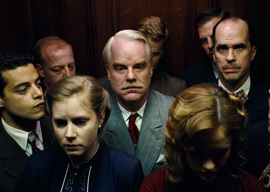
September 19, 2012

Unsurprisingly, the American medical and psychiatric establishment counterattacked, accusing Hubbard of teaching medicine without a license. Either to gain tax breaks or First Amendment protection or both, Hubbard announced in 1952 that his Dianetics self-help movement was now a religion: Scientology. But that bizarre evolution is mostly just hinted at in The Master.
Anderson doesn”t seem terribly interested in the history of Scientology, but he rightly recognized that Hubbard’s “auditing” would give his two stars an excuse for intense dialogues.
Instead of Daniel Day-Lewis’s lone bravura performance overwhelming Blood, The Master gives us two remarkable turns. We see, as in Blood, an older man with superb diction and a grand manner””I am a writer, a doctor, a nuclear physicist, a theoretical philosopher, but above all I am a man.” This time, however, he’s a more jolly, likeable promoter than Daniel Plainview was. Philip Seymour Hoffman (Oscar-winner for Capote) is Lancaster Dodd. His bored son points out that his showman father is just making up his repressed-memories therapy as he goes along, but the charlatan seems to be amusing both his followers and (especially) himself more than he’s hurting anybody.
Instead of Blood‘s irrational rage, The Master‘s entrepreneur develops an irrational regard for a younger man, Freddie, a mentally defective WWII sailor turned alcoholic drifter who walks like a chimpanzee and isn”t noticeably smarter or more responsible. This central role belongs to Joaquin Phoenix, making a startling comeback from his long performance-art hoax/freakout.
Why does the classy cult leader take a shine to this lout, whose brain has been fried by his Navy years drinking “torpedo juice,” denatured 180-proof ethyl alcohol torpedo fuel? (Civilian life has mostly served to expand the number of ingredients”such as paint thinner, mouthwash, and darkroom chemicals”in Freddie’s moonshine.)
Is it a gay thing? There’s not much evidence one way or another in the film. The main explanation that The Master comes up with is that Lancaster Dodd likes the taste of Freddie’s torpedo juice. A standard shtick in movies has always been characters” reacting to the jolt of a slug of hard liquor. The Master gives Hoffman several opportunities to do the most titanic post-guzzle reaction shots in history this side of Tex Avery cartoons.
The only real reason the two characters hang out is so Anderson can film long takes of Hoffman and Phoenix putting on acting clinics. These guys are good.
As the friendship develops, the eloquent Dodd subjects the inarticulate Freddie to his various talk-therapy techniques, which in The Master are modeled upon acting-class methods. The loyal Freddie serves as a guinea pig upon whom Dodd can improvise new therapeutic ideas in front of his paying followers. For instance, Dodd has Freddie shuffle back and forth between wall and window for hours, describing everything he touches. It sounds tedious, but Dodd knows that his audience won”t be bored watching this strangely compelling thug.
Anderson may have intended the two characters as a metaphor for the mid-20th-century conflict in movie acting styles between classically trained actors (such as Lawrence Olivier, who won Best Actor for his 1948 Hamlet) and the new method actors (such as Marlon Brando, nominated as Best Actor for his 1951 Stanley Kowalski). Hoffman acts in the grand old style where elocution mattered, while the mumbling Phoenix embodies the Brandoesque future.
Instead of ending like Blood with one character bashing in the other’s skull with a bowling pin for no particular reason, The Master trails off with a nice warm feeling that the two characters are, despite their differences, still friends.
It’s a weak ending to a weak story line. Can”t Anderson just hire somebody to dream up plot twists for him?